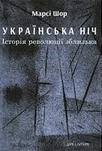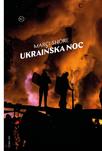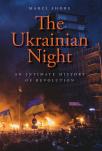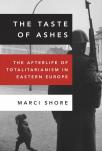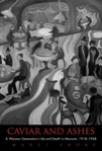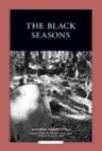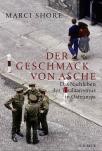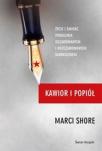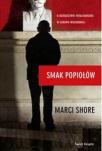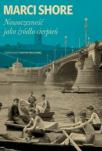Marci Shore teaches modern European intellectual history. She received her M.A. from the University of Toronto in 1996 and her Ph.D from Stanford University in 2001; she taught at Indiana University before coming to Yale. Her research focuses on the intellectual history of twentieth and twenty-first century Central and Eastern Europe. She is the translator of Michał Głowiński’s
The Black Seasons and the author of
Caviar and Ashes: A Warsaw Generation’s Life and Death in Marxism, 1918-1968, The Taste of Ashes: The Afterlife of Totalitarianism in Eastern Europe, and
The Ukrainian Night: An Intimate History of Revolution (
paperback edition, 2024). In 2018 she received a Guggenheim Fellowship for her current book project, a history of phenomenology in East-Central Europe, tentatively titled “Eyeglasses Floating in Space: Central European Encounters
That Came about While Searching for Truth.” She is a regular visiting fellow at the Institut für die Wissenschaften vom Menschen in Vienna. Presently she is co-curating a Public Seminar/Eurozine forum “On the Uses and Disadvantages of Historical Comparisons for Life” (title stolen from Nietzsche): https://publicseminar.org/essays/the-last-time-i-saw-them-new-democracy-seminar-forum/
Her articles and essays include “Philosophy in the Time of Revolution” (The Interlocutor: Journal of the Warsaw School of the History of Ideas); “Can We See Ideas? On Evocation, Experience, and Empathy” (Modern European Intellectual History); “Entscheidung am Majdan: Eine Phänomenologie der Ukrainischen Revolution” (Lettre International); “Jews and Cosmopolitanism: An Arc of European Thought” (Historická Sociologie), “(The End of) Communism as a Generational History” (Contemporary European History); “‘If we’re proud of Freud…: The Family Romance of Judeo-Communism” (East European Politics and Societies); “Rescuing the Yiddish Ukraine (New York Review of Books) “Die Zerbrechlichkeit des Liberalismus oder Das Ende vom ‘Ende der Geschichte’” (Transit: Europäische Revue); “Conversing with Ghosts: Jedwabne, Żydokomuna, and Totalitarianism” (Kritika: Explorations of Russian and Eurasian History); “Children of the Revolution: Communism, Zionism, and the Berman Brothers” (Jewish Social Studies); “Czysto Babski: A Women’s Friendship in a Man’s Revolution” (East European Politics and Societies); “Engineering in the Age of Innocence: A Genealogy of Discourse Inside the Czechoslovak Writers’ Union, 1949-1967” (East European Politics and Societies); “In Search of Meaning after Marxism: The Komandosi, March 1968, and the Ideas that Followed” (Warsaw: The History of a Jewish Metropolis); “Dissidents, Intellectuals, and a New Generation” (The End and the Beginning: The Revolutions of 1989 and the Resurgence of History); (Modernism in) “Eastern Europe” (The Cambridge Companion to European Modernism); “On Cosmopolitanism and the Avant-Garde, and a Lost Innocence of Mitteleuropa” (Utopia/Dystopia: Conditions of Historical Possibility); and “Wspomnienie o Krzysztofie Michalskim (1948-2013)” (Zeszyty Literackie).
Selected Publications
“Wanderings at Twilight: Jan Patočka, the Shaking of Meaning, the Seeking of Truth” Research in Phenomenology (2024):
https://brill.com/view/journals/rip/54/2/article-p253_6.xml
“The World and All That It Holds and The Orphanage,” American Historical Review (September 2024):
https://academic.oup.com/ahr/article/129/3/1007/7745220?utm_source=authortollfreelink&utm_campaign=ahr&utm_medium=email&guestAccessKey=f61b06d4-2d46-4fd4-803c-b17229cf72fc
“In Kyiv, we discuss philosophy, poetry and air raid siren protocol,” co-authored with Amelia M. Glaser, CNN (29 March 2024);
https://www.cnn.com/2024/03/28/opinions/kyiv-ukraine-russia-missile-attack-culture-glaser-shore/index.html
“Hier und jetzt ist der Augenblick der Entscheidung,” Die Zeit (February 2023):
Ostranenie, or the Epistemological Advantages—and Disadvantages—of Marginality,” Britské listy (23 September 2022)
“Invisible Bridges: On Ukraine, Russia, and friendships.” Yale Review (1 September 2022)
“Germany Has Confronted Its Past. Now It Must Confront the Present.” Foreign Policy (8 August 2022)
“Jews and the Ukrainian Question,” The Jewish Review of Books (summer 2022)
“With Eyes Wide Open: An Antidote to Memory Politics,” Social Research (summer 2022)
“Writing Off Russia: Volodymyr Rafeenko interviewed by Marci Shore,” Project Syndicate (1 July 2022)
“Why Ukrainians are Prepared to Fight,” Wall Street Journal (25 February 2022)
“Nine Books to Read to Understand the War in Ukraine,” The Atlantic, 11 March 2022
“This is What Evil Looks Like: Towards a Phenomenology of Evil in Postmodern Form,” Social Research:
“On the Uses and Disadvantages of Historical Comparisons for Life,” Public Seminar
“The Price of Freedom, A Transatlantic Conversation,” Eurozine
“At the Border of Memory and Truth,” review of Maybe Esther by Katja Petrowskaja, New York Review of Books
“The Bard of Eastern Ukraine, Where Things are Falling Apart” (The New Yorker)
“Rescuing the Yiddish Ukraine” (The New York Review of Books)
“The Bloody History between Poland and Ukraine Led to Their Unlikely Solidarity” (The New Republic)
https://newrepublic.com/article/116956/poland-and-ukraine-bloody-history-aside-unlikely-allies
“Rachelka’s Tablecloth: Poles and Jews, Intimacy and Fragility ‘on the Periphery of the Holocaust’” Tr@nsit Online
http://www.iwm.at/read-listen-watch/transit-online/rachelkas-tablecloth-poles-and-jews-intimacy-and-fragility-on-the-periphery-of-the-holocaust/
“The Banality of Merkel” (Foreign Affairs)
http://www.foreignaffairs.com/articles/139410/marci-shore/the-banality-of-merkel
“Out of the Desert: A Heidegger for Poland” (The Times Literary Supplement)
http://www.iwm.at/wp-content/uploads/Out-of-the-desert-TLS.pdf
“The Jewish Hero History Forgot” (The New York Times)
http://www.nytimes.com/2013/04/19/opinion/the-jewish-hero-history-forgot.html
Selected translations
“Seven Dillweeds,” translation from the Russian of the short story “Семь Укропов” from the novel Долгота дней (The length of the day) by Vladimir Rafeenko,
Eurozine;
http://www.eurozine.com/seven-dillweeds/
Podcasts and interviews
“Ukraine–looking from America,” with Volodymyr Yermolenko, UkraineWorld, 21 June 2022;
“Understanding Ukraine. Unity, Defiance, Resistance,” with Richard Davies, podcast series How Do We Fix It?, 4 March 2022;
